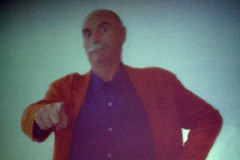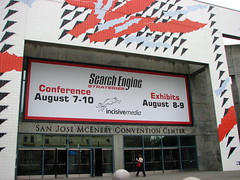I have noticed a couple of stories this week that point to significant changes in the way I will be working with the Net in the next few years.
Firstly, the BBC notes that the City of Norwich in the UK has begun experimenting with a
city wide wi-fi project called
Norfolk Open Link .The Norwich system uses antennas positioned on lamp posts (and other street furniture) to create blanket wi-fi coverage in key sectors of the city. I was interested to read in the Beebs article that in the first three weeks of this pilot they had seen the highest usage around the University of East Anglia, the college in the city and the central library which suggests to me that the 'young' (students, gamers, the young at heart) will be the early adopters of this innovation. I was also interested to note that this pilot had been funded by the Regional Development Agency, which suggests to me that ubiquitous access to the Internet might well be funded in many areas as a way of adding an economic advantage to the local economy.
Of course, Norwich is not alone in this kind of undertaking. I know that San Francisco, for example, has plans to roll out wi-fi right across the city (anyone know where this project has got to?). The Norwich scheme has a relative low connection speed (I think it is 256kpbs for the general public). This has been done so that it does not compete with smaller-scale hi-speed commercial wi-fi. However far from being a limitation, I think this kind of project and funding structure will appeal to cities in the UK. Furthermore, I predict that wi-fi in our city centres will have effect on a number of our cultural institutions, including that most important organ for developing public opinion in the UK - the Pub Bore. Can you image - PB - launches into an 'authoritative' tale beginning with 'Did you know...'. He will then drift across a moonscape of ill-informed prejudice and intellectual flat spots. Meanwhile, at the next table the swift fingers of youth will be searching on the appropriate keywords to pull-down the collective might of WIKIpedia, the BBC and my blog. Who knows, if PB is particularly long-winded they might be able to vlog the windbag's argument (and its counter-argument) as he is pontificating.
I don't want to sound to smug about this scenario, however, because the same might apply to a humble visiting lecturer forced to deliver some rehashed material slightly off subject because of personal poverty and a timetabling clash. This might be particularly hazardous if the students actually do some reading!
The other article from the BBC that grabbed my attention was not really a 'new' news story but one that marked the moment that I finally got the point. The article was headlined '
google makes novels free to print' which, as you can imagine, grabbed my attention. However, on subsequent reading it transpired that the article referred to the
Google Book Search which provides access to the text of books no longer under copyright in print-ready formats (which is hardly the same as 'novels free to print'). However, following the principle of feet-first experimentation which has informed most of my engagement with the web I realize that this search engine is more powerful than I originally thought. I tapped in the word 'addressivity' (a term I used in my PhD thesis after reading Mikhail Bakhtin). It is an obscure word (in the great scheme of things) which delivered 635 individual hits for the whole of the www. Imagine my surprise that it is also used in some 600 books (some of which are nearly new/ some of which were old and obscured). The insights derived from this search engine kick in when one analyzes the context of the word. In many cases, the page, the chapter title and the book synopsis give huge clues to the significance or otherwise of the usage of the term.
I can see that this particular kind of search is going to have quite significant impact on a broad sweep of scholarship over the next couple of years. It is going to bring a lot of material into view in a timely fashion, particularly if scholars start to engage with the database/open API-revolution that is occurring at present.
I hope, however, that I don't sound like a paid-up techno-utopian in this blog post because my first reaction to my search was ...'oh my god'...followed by... 'I hope
my PhD is not out there already'. There is so much written about the term 'addressivity' that it would be impossible to read every single use of the term. However, I am guessing that it might give out arguments to those inclined to argue with you. I am also guessing that this will mean that university scholars will have to be explicit about the fact that their subject knowledge is based on a mere fraction of the total word-horde out there.
Of course, my sense of insignificance, when faced with the stacks of a sizable library, for example, is nothing new. I feel sure that many others have had a similar sensation over the centuries when faced with the British Library collection. Let's face it, total coverage has never been possible. However, now it is made clear with a three second search. Debates should get a bit more lively in the near future!
Watch out the waffler and the over-blown expert!







